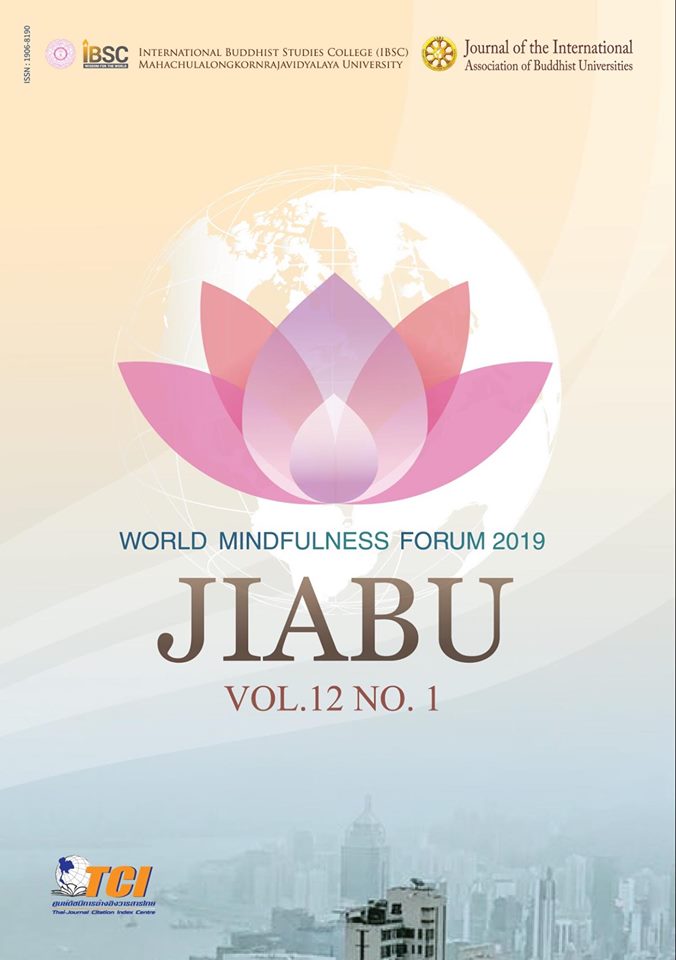A Theoretical Model of Learning Process Based on Modern Educational Psychology and the Concept of Seed in Yogācāra Buddhism
Main Article Content
Abstract
This qualitative research consists of three objectives: 1) to study the learning process in modern educational psychology; 2) to study the concept of Seed in Yogācāra Buddhism; 3) to propose a theoretical model of the learning process based on modern educational psychology and the concept of Seed in Yogācāra Buddhism. Findings show that theories in modern educational psychology have great disputes concerning the source of learning, the role of the learner and the faculty that enables learning. As the concept of Seed in Yogācāra Buddhism deals with the mechanism of the mind at a fundamental level, it helps the establishment of a theoretical model that explains learning process in an integral way in which Seeds and the manifest activities have an influence upon one another, known in this paper as Tri-interaction. As an extension, the model engages an effective learning process in which the function of Object Contingent and Wholesome Mental Factors is emphasized while that of the Unwholesome ones discouraged.
Article Details
Views and opinions expressed in the articles published by The Journal of the International Association of Buddhist Universities (JIABU), are of responsibility by such authors but not the editors and do not necessarily reflect those of the editors.
References
Master Xuanzang, tr. Cook, Francis H. (1999). Three Texts on Consciousness-Only. Berkeley, US: Numata Center for Buddhist Translation and Research.
Master Kuiji. Cheng Weishi Lun Shuji (A Commentary to Discourse on the Perfection of Consciousness-only, Chinese Edition). Tang Dynasty, China.
Vasubandhu, tr. Master Xuanzhuang. Weishi Sanshi Song (Triṃśikā-vijñaptimātratā, Chinese Edition), India.
Cacioppo, J. T. & Freberg, L.A. (2013). Discovering Psychology: The Science of Mind Briefer Version. Boston: Wadsworth, Cengage Learning.
Coolican, H. (2007). Applied Psychology (2nd Edition). London: Hodder Education. Coon, D. & Mitterer, J. O. (2009). Introduction to Psychology: Active Learning Through Modules (12th Edition). Marceline, US: Wadsworth, Cengage Learning.
Coon, D. (1983). Introduction to Psychology: Exploration and Application. Eagan, US: West Publishing.
Feldman, R. S. (2011). Understanding Psychology (Tenth Edition). New York: McGraw-Hill.
Geiwitz, J. (1980). Psychology: Looking at Ourselves (Second Edition). Toronto: Little, Brown, and Company.
Gross, R. (2010). Psychology: The Science of Mind and Behaviour 6th Edition. London: Hachette UK.
Jiang, T. (2010). Yogācāra Buddhism & Modern Psychology. Delhi: Motilal Banarsidass.
King, L. A. (2014). The Science of Psychology: An Appreciative View (Third Edition).
New York: McGraw-Hill. Lahey, B. B. (2012). Psychology: An Introduction (eleventh edition). New York: McGraw-Hill.
Lin, G. (2007). Cheng Weishi Lun Zhijie (A Direct Translation and Commentary to Discourse on the Perfection of Consciousness-only, Chinese Edition). Shanghai: Fudan Press.
Morreale, S. P., Spitzberg, B. H. & Barge, J. K. (2006). Human Communication: Motivation, Knowledge, and Skills (Second Edition). Boston: Cengage Learning.
Nairne, J.S. (2009). Psychology (5th Edition). Belmont: Thomson Higher Education. Phillips, D.C. &Soltis, J. F. (2009). Perspectives on Learning. New York: Teachers College Press.
Rathus, S. A. (2007). Psychology: Concepts & Connections (8th Edition). Belmont, US: Thomson Higher Education.
Reed, S. K. (2013). Cognition Theories and Application (9th edition). Boston: Wadsworth, Cengage Learning.
Schunk, D.H. (1991). Learning Theories: An Educational Perspective. New York: Macmillan. Tagawa Shun’ei (2009). Living Yogācāra: An Introduction to Consciousness-Only Buddhism.
Charles Muller (tr.). Boston: Wisdom Publications.
Westwood, P. (2008). What teachers should know about. Camberwell: ACER Press.
Skinner, B. F. (1974). About behaviorism. New York: Ramdom House, Inc.
Delpit, L. (1988). The silenced dialogue: Power and pedagogy in educating other people’s children. Harvard Educational Review, Vol.58. Jia,Q. (2010). A Brief Study on the Implication of Constructivism Teaching Theory on Classroom Teaching Reform in Basic Education. International Education Studies. Vol. 3, No. 2.
Kerka, S. (1997). Constructivism, Workplace Learning, and Vocational Education. ERIC Digest, ED407573, No. 181.
Piaget, J. (1980). Piaget’s Theory. P. Mussen, ed., Carmichael’s Manual of Child Psychology.
New York: John Wiley.
Rose, J. (2005). Independent review of the teaching of early reading: Interim report.
A Research Report. London: Department for Education and Skills.


